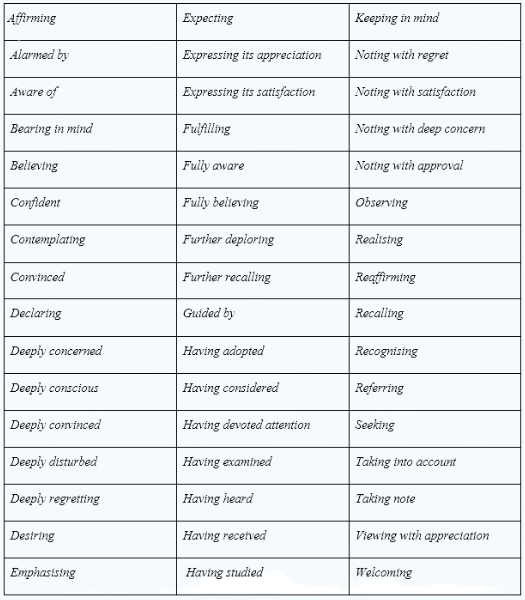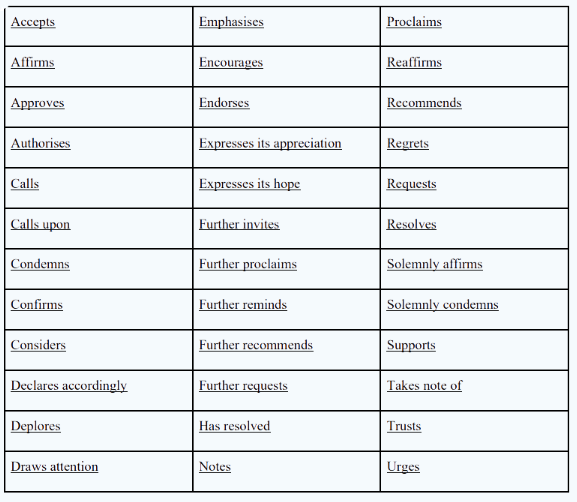Becoming a Delegate
As a delegate at an MUN conference you will be assigned two things:
In the first place, you will represent a member state of the United Nations and act as an emissary of its respective government. As such, it is your job to actively represent that state, its interests and positions on relevant issues of international importance authentically, even if this contradicts your personal opinion or factual situations.
In so doing, you must be well versed in the stance of your state. While preparing – either together with your delegation or individually – you should work out the special features of your country by familiarising yourself with its history, geopolitical location, social and economic factors, and important allies. It is also advisable to think about potential partner countries with similar interests and goals in advance of the conference, as cooperation with them will be beneficial.
In the second place, you will be assigned to a specific council, where as a rule, you will deal with two current global topics and for which you will have to prepare some documents in advance. On the one hand, delegates prepare position papers in which they present their country’s position to the other parties within your council. Secondly, delegates write working papers which serve as a basis for the work in the council. Finally, at the conference itself, delegates try to write up and pass a resolution that includes answers and solutions to the problems presented by the council’s topic which are acceptable to other countries present.
How to Research
When you have applied to our MUN, you are assigned a country to represent. Then, you will start preparation for your position paper. If you do not know where to start, read this article for some guidance!
Where to Start?
We know that Google will quickly provide a wealth of information on any given topic. But, before making use of a source, it is essential to check if it is reliable!
When in doubt about the reliability of a source, a quick look at the imprint of the website helps. Additionally, you do not have to rely exclusively on neutral sources, such as the official website of the UN. Since you are looking for the specific position of a particular state, looking at its own statemenets is just as worthwhile. In this way, you can get an idea of how countries view themselves and assess current events. Objectivity does not prevail in the world of international politics after all, but all information always serves a specific purpose – it is meant to convince the reader of a particular point of view. Keep in mind that even statistics do not guarantee objectivity!
In the following sections we have compiled a brief list of sources and helpful websites for your research.
Treaties and agreements layd down the binding rules and regulations which have been agreed upon by the signatory states. Therefore, if your country has signed an international treaty, you should generally comply with its rules.
Websites of international organisations (for example, the UN and the EU) are good sources here.
While national laws shows the current legal situation in your country, other official documents, such as press releases and strategy papers demonstrate the actions of your state in a particular domain of politics.
Positions from statements issued by your state can easily be adopted. When doing your research, it is recommended to look at the websites of the Ministry of Foreign Affairs first, and your state’s permanent representatives at the United Nations.
Scientific studies through academic papers present findings on a particular issue. They are suitable for underlining positions or understanding how complex political interrelationships work.
Academic journals and information centres are good sources for this.
The international press offers a vast variety of information about current global events.
When looking for news websites and reliable articles, internationally renowned media should be your first choice. Some examples include: The Guardian, The New York Times, BBC and CNN.
But keep in mind: media articles are usually written from a specific perspective and want to convey a particular point of view to their readers. Therefore, they should never be the only basis of your preparation.
The first port of call for general questions about the United Nations and its handling of specific issues is the organisation’s official website. Here, information on all of its bodies and discussed issues can be found, along with resolutions, statements as well as minutes of conferences.
There are some information portals and databases that we recommend for your research:
- Wikipedia: This is not a scientific source, but it is very useful for getting a general overview of a topic.
- Official website of your state.
- World Factbook of the CIA.
- International Monetary Fund’s country information: This is useful for obtaining economic data.
- Country Reports: This contains information specific to individual countries on various topics. Additional country profiles and thematic reports can be found at www.infoplease.com.
How to Write a Position Paper
Position papers are your first official step as a delegate towards the conference. For each topic that will be discussed in your council, writing a position paper is required. It describes the attitude of your state towards each respective topic, and as such functions as an official statement of your government. When writing a position paper, consider the following:
A position paper does not represent your personal opinion, but that of your government. Accordingly, it should be formulated from the point of view of your state and should always make use of the 3rd person singular (e.g. “Latvia is of the opinion that…”), rather than the 1st person.
Although states try to present themselves in a positive light, they mostly stick to the facts – however, their interpretation may vary. Therefore, you should familiarise yourself with controversial actions and attitudes of your government so that you are prepared for any attacks coming your way.
Note that a position paper should address at least three points for dicussion presented in your council’s Background Paper in addition to your country’s position in relation to the general topic.
Pay attention to spelling, grammar, and make use of a diplomatic style of language.
Consult the following list of things that your position paper should include:
- Importance that your state attaches to the topic;
- Its issue-related memberships in international organisations and/or international treaties;
- Assistance and support that your state receives or that your state provides to other countries;
- Actions your state has already taken and intends to take in the future;
- Ideas and suggestions on how the international community can resolve the issue from your state’s perspective;
- Conflicts that your state foresees in the context of the issue;
- Assessment of the behaviour of other states.
The paper should not be too long – 300 to 500 words per topic is recommended. The required specifics may vary from conference to conference, which is why you should read the instructions provided by your chairs carefully. After your paper has been approved by the council chairs, you can start debate. You will also receive corrections, feedback and suggestions for improvement from your chairs.
How to Write a Working Paper
Writing a working paper is the final step of preparation for the conference. A working paper is a proposal for the drafting of a resolution that its author would ultimately like to see adopted by the council. The working paper serves as a starting point for the debate and will be expanded on throughout your negotiation with other delegates.
As the working paper is intended to act as an official statement of the UN, it is important to pay close attention to spelling and grammar. Furthermore, working papers have a strictly prescribed structure that corresponds to the external format of a resolution without adopting its official status.
Working papers consist of a single long sentence divided into three sections, and finally end with a period.
- The HEADING of each resolution is written in all capital letters and includes the relevant council and topic being discussed.
- The PREAMBLE, which consists of at least three paragraphs, serves as an introduction to the resolution and often refers to existing resolutions and agreements, as well as the importance of the issue and the rationale for your council’s action.
- The OPERATIVE SECTION, which connsists of at least five operative paragraphs, is the core of the resolution. It contains statements, demands, guidelines, definitions, and proposed solutions. The operative section must not contradict the preamble.
Each statement in the preamble and operative section is outlined in a single paragraph. While the paragraphs of the preamble are separated by commas (,), semicolons (;) take over this task after the operative paragraphs.
The individual paragraphs in the preamble and operative section are introduced with fixed phrases, the so-called operators. These operators differ between the preamble, where they are italicised, and the operative part, where they are underlined. A list of operators can be found below. When using the operators, pay attention to the scope of your council’s authority under international law. Only the Security Council can issue orders that are binding on the international community under certain circumstances.
It is possible (and encouraged) to use subparagraphs and subheadings in the operative section when writing your working paper.
Subheadings are written in bold and precede three or more operative paragraphs that are related in content. Subheadings aim to structure the working paper more clearly and enable the reader to orientate themselves easily. Therefore, subheadings should be as concise as possible. For example, “Political Measures” and “Economic Measures” or similar expressions are suitable.
Subsections must always refer to an operative paragraph and cannot stand alone. They are numbered with Roman numerals. Subparagraphs are enumerations; therefore, operators cannot be used in subparagraphs.
Just like the position paper, the resolution will be corrected by your chairs. If you wish to submit your working paper to the conference so that it can be debated by the council and play its part in the eventual resolution, it must be submitted to the chair in digital form. It is recommended to have the working paper as a Word document and Google Docs document during the conference. This way it can be shared with a wider audience when interacting with other delegates without the risk of sabotage.
Want to find out more about the MUN-specific words and phrases? Have a look at our dictionary!









